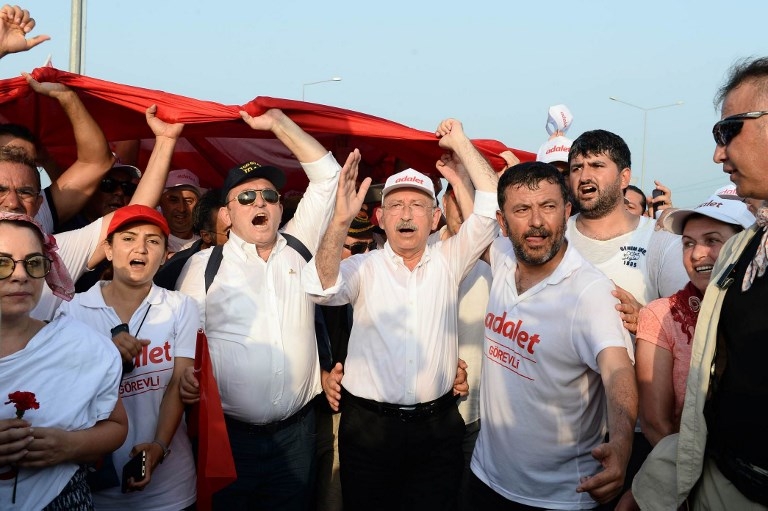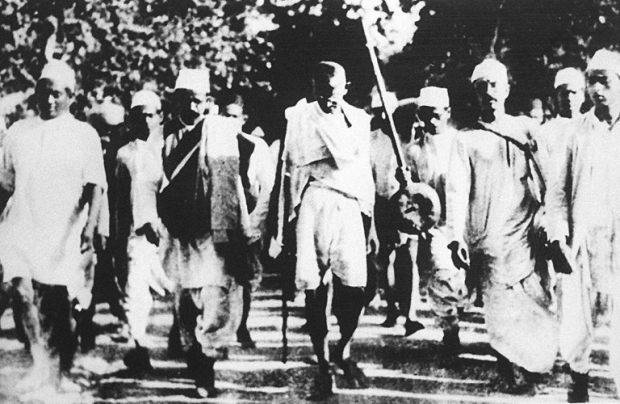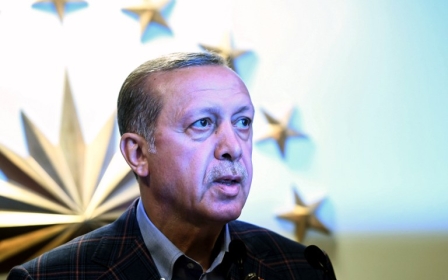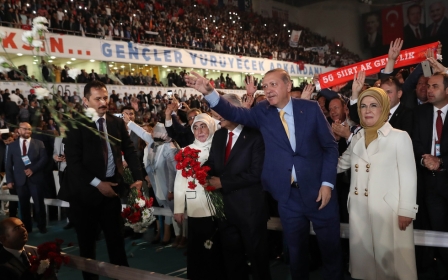Gandhi or Gump? The Turkish opposition leader’s march for justice

In early 1930, India’s Mahatma Gandhi staged a march against Britain’s monopoly on salt production. In what became known as the Salt March, Gandhi walked across the Indian state of Gujarat. Many of his followers were either beaten or arrested by the authorities. Gandhi himself was interned for several months. But Gandhi was not merely demonstrating the price of salt, he was beginning his non-violent campaign to end British rule.
On 15 July, Turkey’s main opposition leader Kemal Kilicdaroglu began a 250-mile march from Ankara to Istanbul holding a sign with the single word “adalet”, the Turkish word for justice. This walk has the potential to be the country’s most significant act of social activism since 2013’s Gezi Park protests. It also has the potential to fall by the wayside.
Sure, Kilicdaroglu spoke his mind and challenged Erdogan and the AKP, but his delivery was more whisper than roar
To spice up Kilicdaroglu’s image, his supporters branded him Turkey’s Gandhi. Inside his body that appeared meek and mild was a man of strong will and moral fibre with the wherewithal to unite the country and defeat the increasingly oppressive Erdogan and AKP.
But election days came and went and Kilicdaroglu was unable to live up to the hype. In the 2011 and 2015 elections, his party won only around 25 percent of the vote. Sure, Kilicdaroglu spoke his mind and challenged Erdogan and the AKP, but his delivery was more whisper than roar.
The lead up to the walk
The tide turned after last summer’s attempted coup by a military faction loyal to Fetullah Gulen, a self-exiled Turkish Islamic preacher based in Pennsylvania in the US.
Kilicdaroglu condemned the coup outright and sought to stand shoulder to shoulder with the government, but broke ranks and became highly critical when the post-coup purge started to resemble more of a witch hunt against Erdogan’s opponents with hundreds of thousands of state employees either arrested or summarily dismissed.
Berberoglu’s arrest and conviction was only possible because Kilicdaroglu did not oppose a May 2016 parliamentary bill that lifted the immunity of MPs
When Erdogan and the AKP sought constitutional changes through a referendum to grant the president more power, Kilicdaroglu served as the de facto leader of the No campaign and managed to secure 49 percent of the votes in the April referendum. This was a narrow defeat in a vote that was unfair and faced allegations of fraud.
Kilicdaroglu’s march for justice is an attempt to capitalise on feelings of discontent. Many Turks are angered that during the prolonged state of emergency, many have been arrested or fired for no more than mere suspicion of being sympathetic to the Gulen Movement.
Then in May the son-in-law of the AKP mayor of Istanbul was arrested, and soon after released (He has since been rearrested, but on different charges). So was the son-in-law of former deputy prime minister and AKP co-founder Bulent Arinc. Others are shocked that two teachers who went on a public hunger strike for being unfairly dismissed were instead arrested and that scores of journalists remain behind bars.
Selective interventions
The final straw for Kilicdaroglu was the arrest, conviction and sentencing of CHP lawmaker Enis Berberoglu, accused of espionage for leaking tapes to the press of Turkish trucks full of arms heading for Syria. And so Kilicdaroglu marches in the hope of uniting Turkey against such injustices.
But Kilicdaroglu is no Gandhi. Berberoglu’s arrest and conviction was only possible because Kilicdaroglu did not oppose a May 2016 parliamentary bill that lifted immunities of parliamentary deputies. The law was specifically designed by the government to suppress the left-wing and Kurdish-oriented Peoples’ Democratic Party (HDP).
As a direct result, HDP leaders such as Selahattin Demirtas and Figen Yuksekdag are languishing in prison under trumped up and politically motivated charges relating to terrorism. Where was Kilicdaroglu’s moral character then?
Herein lies Kilicdaroglu’s problem. Gandhi was only successful because the British thought that they could physically suppress him. One is reminded of the scene of the Academy Award-winning movie Forrest Gump where the leading protagonist, having run across America attracting followers to his cause, suddenly grinds to a halt. His followers expect a grand declaration, a speech, a statement, something, but instead they get nothing from the clueless Gump.
Kilicdaroglu is no Gump, but unlike Gandhi, it is questionable whether he can finish what he started.
- Simon A Waldman is visiting fellow at King’s College London and the co-author of the recently published, “The New Turkey and Its Discontents.” He tweets @simonwaldman1
The views expressed in this article belong to the author and do not necessarily reflect the editorial policy of Middle East Eye.
Photo: On 3 July 2017, Kemal Kilicdaroglu (C) walks with thousands of supporters on the 19th day of his 425-kilometre "March for justice" in the northwestern province of Kocaeli. (AFP/CHP Press Office)
New MEE newsletter: Jerusalem Dispatch
Sign up to get the latest insights and analysis on Israel-Palestine, alongside Turkey Unpacked and other MEE newsletters
Middle East Eye delivers independent and unrivalled coverage and analysis of the Middle East, North Africa and beyond. To learn more about republishing this content and the associated fees, please fill out this form. More about MEE can be found here.







